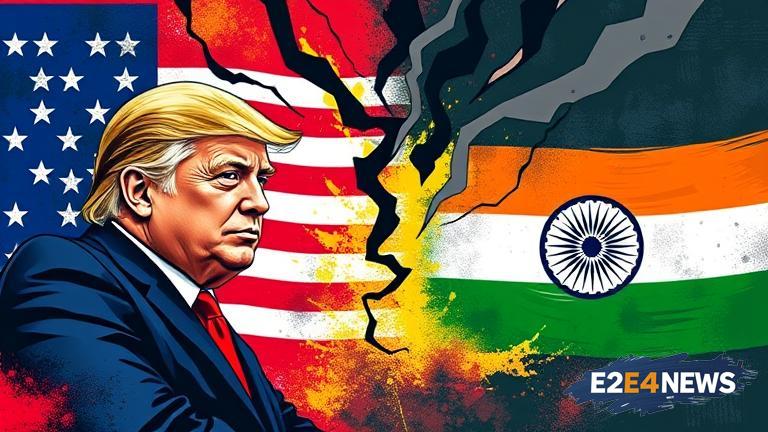The United States has imposed tariffs on Indian goods, citing unfair trade practices and intellectual property concerns. This move has sparked concerns among Indian businesses and policymakers, who fear that it could negatively impact the country’s economy. India has retaliated by imposing tariffs on US products, including almonds, apples, and walnuts. The trade tensions between the two nations have been escalating over the past year, with the US seeking greater market access and India pushing for a more balanced trade relationship. The tariffs imposed by the US are expected to affect Indian exports, including textiles, pharmaceuticals, and chemicals. The Indian government has expressed disappointment over the US decision, stating that it would harm the country’s economy and affect the livelihoods of millions of people. Prime Minister Narendra Modi has spoken to US President Donald Trump, urging him to reconsider the tariffs and work towards a more collaborative trade relationship. The US has also imposed tariffs on Chinese goods, leading to a trade war between the two nations. India has been seeking to capitalize on the US-China trade tensions by offering alternative trade arrangements to the US. However, the US tariffs on Indian goods have cast a shadow over these efforts. The Indian government has announced plans to impose tariffs on US products, including agricultural goods and machinery. The tariffs are expected to come into effect soon, and could lead to a further escalation of trade tensions between the two nations. The trade tensions have also sparked concerns among Indian businesses, who fear that they could lose market share and revenue due to the tariffs. The Indian economy is already facing challenges, including a slowdown in growth and a decline in investor sentiment. The trade tensions with the US could exacerbate these challenges and affect the country’s economic prospects. The Indian government has announced plans to diversify its trade relationships and reduce its dependence on the US market. However, this could be a challenging task, given the significant trade volumes between the two nations. The US is one of India’s largest trading partners, and the tariffs could affect bilateral trade relations. The trade tensions have also sparked concerns among international trade experts, who fear that they could lead to a global trade war. The World Trade Organization (WTO) has urged nations to avoid protectionist policies and work towards a more collaborative trade relationship. The Indian government has stated that it would work with the WTO to resolve the trade tensions and promote a more balanced trade relationship. The trade tensions have also sparked concerns among Indian farmers, who fear that they could lose market access and revenue due to the tariffs. The Indian government has announced plans to support farmers and help them adapt to the changing trade landscape. The trade tensions have also sparked concerns among Indian consumers, who fear that they could face higher prices and reduced availability of goods due to the tariffs. The Indian government has stated that it would work to minimize the impact of the tariffs on consumers and ensure that they have access to affordable goods.
